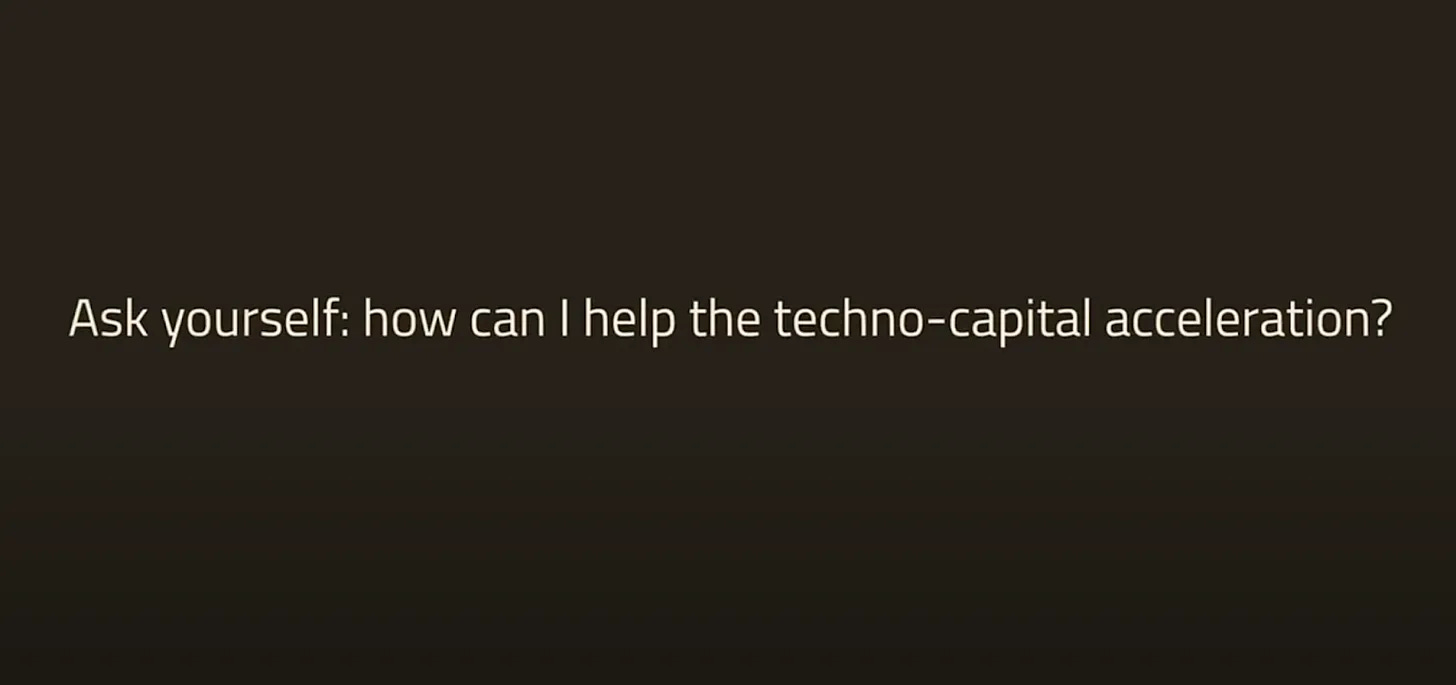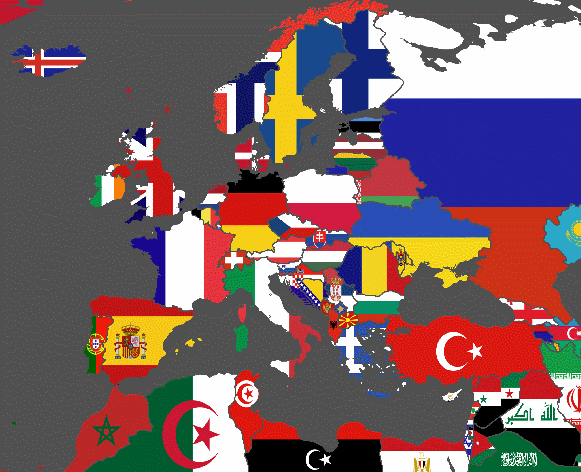It’s clear in all his speaking and writing that Srinivasan favors the “exit” path. And is this any different from Elon Musk’s plans to colonize Mars? “This planet (or country) may be fucked, but together we can colonize another before it gets too utterly hopeless here.”
As with the Mars “exit strategy” idea though, an important question arises: who, exactly, gets to exit? While perhaps a viable choice for the uber-wealthy with the resources to make it happen, what about all the rest of us schmucks?
Last week we discussed the naive ideas of numerous billionaires and crypto investors to create new cities and nations “from scratch” in physical locations around the world.
And today, we’ll explore an idea that’s perhaps even more naive: the creation of a “network state,” a futuristic, utopic nation that exists solely online. A country presumably consisting of citizens scattered around all the corners of the globe.
I apologize for the length of this one. But these are meaty topics, and I think they’re worth discussing. The people pushing these ideas are very wealthy, and very influential, and have some very dark ideas about the types of governments they want to create — whether online or in very real places, like San Francisco.
The Dark Enlightenment
Lest we think these are merely fun billionaire pipe dreams, let’s take a moment to explore the politics driving a lot (most) of these projects.
We discussed Peter Thiel’s many investments in a number of “startup nation” projects last week — like the Seasteading Institute, which Thiel later admitted is “not quite feasible from an engineering perspective.” And then there’s his much more moneyed and bizarre Praxis, the stated mission of which is “to build a better future for Western Civilization” full of people who “pursue the traditional paths of self-overcoming: heroism and contemplation.”
I somehow failed to mention the tiny community on a Honduran island called Próspera that Thiel has also invested in. And which — unsurprisingly! — the Honduran government and local communities have begun pushing back against.
Thiel’s political investments go beyond utopian “startup nation” projects, too. Recent reporting has tied his influence to numerous powerful characters, including JD Vance and others within the “New Right.” This potentially-terrifying, authoritarian-leaning streak in the conservative movement has been termed “The Dark Enlightenment,” and it’s by no means disconnected from these “new nation” projects.
One of these ideas’ progenitors is Curtis Yarvin, who writes online as “Mencius Moldbug.” He “has endorsed slavery, noting that some races are ‘better suited’ for it than others,” and as Jessica Klein wrote for Breaker Magazine, also:
“Believes that feudalism is superior to democracy. In his modern feudalism, kingdoms would instead look like corporations, with CEOs as sovereigns. Without those pesky chains of democracy holding him back (for it would surely be a “him”), the CEO can make decisions that would be necessarily beneficial because they’d be financially profitable.”
“Kingdoms would instead look like corporations” is a critical concept here. Is it any surprise that men who’ve seen vast personal gain running for-profit tech corporations might believe countries should be run the same way?

Balaji Srinivasan is perhaps the leading voice for “nations in the cloud,” evangelizing an idea we’ll soon discuss that he calls the Network State. But before we get there, it’s instructive to understand how the unholy nexus of himself, Thiel, and “Dark Enlightenment” authoritarian ideals blend together.
I’ve read and listened to a lot of Srinivasan’s ideas these past few weeks — which is exhausting, and at times, infuriating. (You’re welcome.) It’s very clear the man possesses an almost perverse reverence for technology and capitalism, and an equally passionate hatred of established social institutions.
Especially media — he really hates the media. He once urged his audience to dox a New York Times journalist, and portrayed the media — especially the Times — “as the chief enemy of the Network State ideology.”
Srinivasan shares some of his very dystopic, techno-capitalist visions for the role of American media and governance with Garry Tan. He’s the CEO of Y Combinator, perhaps the most prestigious technology accelerator in Silicon Valley — Airbnb, Dropbox, Instacart, DoorDash, Reddit, and more started out there — and therefore holds quite an influential position.
I recommend reading this article if you’re interested — it discusses Srinivasan’s discursions over the course of a four-hour podcast interview. But I’ll include some of the juiciest, darkest bits of his visions for a future San Francisco here.
He says he would “like to do to San Francisco what Elon Musk did to Twitter.” Which I suppose means he’d fire lots of people, cause residents to flee in droves, and lose lots of money?
More seriously, Srinivasan envisions:
“‘A tech-governed city where citizens loyal to tech companies would form a new political tribe clad in gray t-shirts….
Grays would also receive special ID cards providing access to exclusive, Gray-controlled sectors of the city. In addition, the Grays would make an alliance with the police department, funding weekly ‘policeman’s banquets’ to win them over.
‘Grays should embrace the police, okay? All-in on the police…’
‘A huge win would be a Gray Pride parade with 50,000 Grays…. That would start to say: “Whose streets? Our streets!.... Reds [Republicans] should be welcomed there, and people should wear their tribal colors… No Blues [Democrats / Progressives] should be welcomed there.’
The Grays will rename city streets after tech figures and erect public monuments to memorialize the alleged horrors of progressive Democratic governance. Corporate logos and signs will fill the skyline to signify Gray dominance of the city. ‘Take total control of your neighborhood. Push out all Blues. Tell them they’re… unwelcome.’
‘Just as Blues ethnically cleanse me out of San Francisco…. push out all Blues.’”
All this is of course chilling given the historic connotations of ID cards and colored shirts to segment populations. And even if we ignore the autocratic vibes, all this just sounds gross. San Francisco is already far too tech-reverant for most anyone I know.
Voice, or Exit
Now that we have a better sense of the ideologies of these men, let’s revisit the “startup nation” ideas they’re pushing.
Srinivasan describes his “Network State” idea as “‘a highly aligned online community with a capacity for collective action that crowdfunds territory around the world and eventually [somehow?] gains diplomatic recognition from pre-existing states.’”
He published a book about the idea in 2022, in which he “explains how to build the successor to the nation state.” And last year he launched an annual Network State conference where people gather to share all kinds of crypto-utopian state ideas. He recently launched a fund to invest in new network state-type projects, too — and advises Pronomos Capital, a fund with similar goals, in which Peter Thiel has (of course) invested.
The busy boy!
I shared this image — from last year’s Network State conference — last week. But I can’t think of a phrase that better encapsulates the ideology driving these projects:

Srinivasan recently announced the launch of his Network School, expressing a desire to build “a technocapitalist college town, a Stanford 2.0.” He once taught there, and writes that “I still admire what Stanford once was, but it’s in decline just like other US institutions. I do feel fortunate that I didn’t waste my life in academia like some of my peers. But I also want to build an Internet-first version.”
In his writing and speaking, Srinivasan frequently discusses the two avenues he envisions for enacting political change. One can choose “voice,” to change a system from within — protesting, donating, voting, or even leading a revolution. And one can choose to “exit”: to leave the system entirely to create a fresh start, from scratch.
It’s clear in all his speaking and writing that Srinivasan favors the “exit” path. And is this any different from Elon Musk’s plans to colonize Mars? “This planet (or country) may be fucked, but together we can colonize another before it gets too utterly hopeless here.”
As with the Mars “exit strategy” idea though, an important question arises: who, exactly, gets to exit? While perhaps a viable choice for the uber-wealthy with the resources to make it happen, what about all the rest of us schmucks?
It might be fun to call these “nations,” in the same way it’s fun for young boys to build a treehouse and install a “NO GIRLS ALLOWED” sign out front. But at the end of the day, the treehouse still exists in someone’s yard — it can be protected, or chopped down. And god forbid one of the boys should fall and break his arm, he’ll visit an Emergency Room far beyond the treehouse’s borders, too.
Unlimited Opportunity
In another podcast interview, Srinivasan describes the world as consisting of “ascending” and “descending” classes. Someone in India buying her first 5G smartphone is “ascending”, while the “Brooklyn Wokes” are headed downward. (Srinivasan provides an example of a hypothetical Time journalist who’s lost their job and must move in with their parents at the age of forty to illustrate this. Again, he seems to really hate journalists.)
"The ascending world and descending world exist within every country now,” says Srvinivasan. “They exist within every apartment building. You have some person who's doing great online, and another person who's just gotten canceled. And that can literally happen thirty feet away.”
It’s telling, I think, that Srinivasan views “doing great” and “getting canceled” as the greatest highs and lows of most individuals’ online experiences.
Srinivasan waxes poetic about the opportunity he believes the internet brings the global poor. People he claims could, at least in theory, become citizens of his networked state. The mobile phone is a “skyhook to opportunity,” he says. “With the internet, you have this incredible equality of opportunity.... the world really is your oyster… If you've got a laptop and you've got a quiet room and you're not in the middle of a civil war, or riots, or something like that... you have unlimited opportunity in front of you if you just hit the right keys on the keyboard."
If he’s sincere in saying this — and I do question whether he is, or if it’s all just window-dressing for his libertarian fantasies — then it reminds me of the naive idealism I and so many others clutched to fifteen or twenty years ago. Back when the internet still seemed brimming with hope.
That was a time when many believed the internet would inevitably bring information and education to the world and “level the playing field.” It was then that a nonprofit run by a high-minded tech philanthropist planned to throw laptops from a helicopter to see how villagers might use them without instruction. And it was then that a computer science professor installed a computer in a “hole in the wall” in a poor Indian slum, and claimed the children there used it to coordinate their own education.
But we’ve learned a lot since then; or at least, most of us have. Those projects held great hope — but then the computers broke, or got stolen. And people studying these things, including myself, came to realize that most of the global poor want to use the internet for socialization and communication, just as most of the global wealthy do. Observers began to see that instead of only using computer kiosks to seek education and jobs, the global poor often used them to watch porn. And why shouldn’t they?
In other words, the idea that Srinivasan’s “Network State” will be an enclave for any but the most wealthy, privileged, and motivated has been forcefully negated by historic experience. “People's fortunes are less tied together by geography; they're tied together by the social network,” says Srinivasan, who grew up the child of Indian immigrants on Long Island.
This of course ignores the very-local frameworks that supply social and financial stability to the vast majority of the world’s population. One’s fortune may not be tied to geography — so long as that person, like Srinivasan, grew up with good parents and a good education, intelligence and ambition and luck, and managed to attend a prestigious university, join prestigious companies, build some capital, and go out into the world from there.
As Vitalik Buterin, who co-founded Ethereum, noted in a review of Srinivasan’s book:
“This is all great for skilled professionals and rich people…. But what about regular people? What about the Rohingya minority facing extreme conditions in Myanmar, most of whom do not have a way to enter the US or Europe, much less buy another passport?”
These questions ultimately cut to the heart of all the “startup state” endeavors. And they force us to ask who they’re really for.
Even Clouds are Shaped by the Land Beneath Them
A nation may be, in a sense, an imagined community — but it also consists of shared cultural norms and shared physical roots. Community can’t only exist “in the cloud” — it’s in our neighborhood cafes, parks, gardens, schools, and subway cars as well.
Ultimately, Srinivasan’s ideas — just like those evangelizing NFTs and the metaverse — appear derived from a mind that spends far too much time online, and residing in the company of those spending far too much time there, too. From a mind that believes everyone in the world feels as passionately about digital spaces as he does — and incredibly ignores the very physical spaces from which people must “dial in.”
It’s remarkable the number of Network State conference presentations that focus on catering to digital nomads. Several speakers even addressed digital nomads’ feelings of loneliness — without explaining how creating a “community” that exists solely online might ameliorate that.
And even digital nomads must exist somewhere physical. Just as we saw last week that startup nations and cities like those championed by Srinivasan and Thiel will struggle to find viable places to build “from scratch”, digital nomads face similar questions.
Even if a community or country exists online, those populating it must live somewhere — somewhere they’ll inevitably impact the real-world people and communities around them. And these communities are unlikely to care whatever “internet nations” the gentrifiers raising prices around them claim to be a part of.

These ideas have floated around libertarian intellectual circles for years. They perhaps began with the publication of The Sovereign Individual in 1996 (for which Peter Thiel later — surprise! — wrote a foreword), and onto The New Digital Age, published by Jared Cohen and former Google CEO Eric Schmidt. I’ve mentioned the book before, but it’s quite relevant here.
Regarding the book’s suggestion of a “virtual Chechnya”, Evgeny Morozov wrote in his excellent review:
“The Chechen rebels and their media outlets do operate several websites. Indeed, the most prominent of them, such as the Kavkaz Center, were forced to move their servers across several countries to ensure that they could operate without too much interference by the Russian authorities, finally settling in Scandinavia. But just because the Chechnya of the rebels’ imagination has a website doesn’t mean that we are witnessing the ‘virtual Chechnya’ of Schmidt and Cohen’s imagination….
So what if the rebels can proclaim their “virtual independence”? As propaganda victories go, this is next to worthless. They might as well announce that, after decades of violent struggles, ordinary Chechens are finally free to breathe or to wink: not exactly a meaningful improvement in human freedoms. A declaration of “virtual independence” changes nothing geopolitically, not least because the Russian-Chechen conflict is, at the heart of it, a conflict about a piece of land—of physical reality. Unless that piece of land is secured, ‘virtual independence’ is meaningless.”
Note his words, that “the Russian-Chechen conflict is, at the heart of it, a conflict about a piece of land — of physical reality.” A nation may be an imagined community, but it also consists of shared cultural norms, and shared physical roots. Community can’t only exist “in the cloud” — it’s in our neighborhood cafes, parks, gardens, schools, and subway cars too.
Ultimately, nation-building requires a lot of work, and passion. And it’s not clear to me tax breaks and dreams of economic liberty are strong enough motivations for anyone to go out and build one — except, of course, the wealthiest of individuals. People who have nothing else to worry about, like Balaji Srinivasan and Peter Thiel.
It’s interesting that Srinivasan continually references the creation of Israel as a model for his new state ideas. As reported in the New York Times, his favorite newspaper:
“‘That country was started by a book,’ he tweeted in 2022, referring to Theodor Herzl’s 1896 manifesto, ‘The Jewish State.’ ‘You can found a tribe,’ Srinivasan said on a podcast. ‘What I’m really calling for is something like tech Zionism — when a community forms online and then gathers in physical space to form a ‘reverse diaspora.’”
As we can see today, anyone hoping to build “another Israel” should give a lot of thought to the long-term consequences of their actions. But even the original Zionist project at least carried a compelling why motivating the creation of that nation.
As Antonio Garcia Martinez writes,
“Something more is also needed to build a state, whether of the network or regular variety. Our opinions alone, no matter how lit the resulting Twitter threads, simply aren’t equal to the task. Something must stir inside us that says: Here I will die so that my children may one day live. That’s what has motivated every generation of Israeli as it has marched off to a perpetual war of survival; it’s what motivates the fierce resistance of the Ukrainians against the Russian invasion now. Without that, any aspiring state is just a gated community for the working wealthy, much like the ones for old retirees in South Florida. San Francisco and Manhattan are already functionally that…”
He has a point. The more one see how these “startup nations” actually look, the more clearly they resemble mere gated communities — or at most, Special Economic Zones, of which over 5,400 already exist in the world.
It might be fun to call these “nations,” in the same way it’s fun for young boys to build a treehouse and install a “NO GIRLS ALLOWED” sign out front. But at the end of the day, the treehouse still exists in someone’s yard — it can be protected, or chopped down. And god forbid one of the boys should fall and break his arm, he’ll visit an Emergency Room somewhere far beyond the treehouse’s borders, too.

It’s hard to say if this will ever amount to much. My hunch is not — that these ideas will fall by the wayside, just as NFTs, Clubhouse, and the Metaverse did.
As with those projects, it’s clear there’s a small contingent of very-wealthy, very-online individuals who absolutely adore spending time with technology. And who don’t seem to realize the rest of us just don’t care so much. That some of us, bizarrely, seem to actually enjoy the physical presence of other humans and the feel of sun, wind and rain on our skin.
The amazing thing to me is how eager so many people are to embrace these ideas. Didn’t the pandemic help us all to realize that more time alone at home before our screens isn’t a boon for our mental health? There’s a reason all those Zoom happy hours died off once we were able to go out and join real, you know, happy hours.
The seeming worst that came of projects like NFTS and the Metaverse was that a lot of mostly-wealthy people lost a lot of money. And perhaps that’s all we’ll see here.
But it’s not a bad idea to keep an eye on them. Because there’s a whole bunch of money being fueled into these, by a whole bunch of very influential people with a whole bunch of sinister ideas.
Song of the Week: Mason Lindahl — Sky Breaking, Clouds Falling






